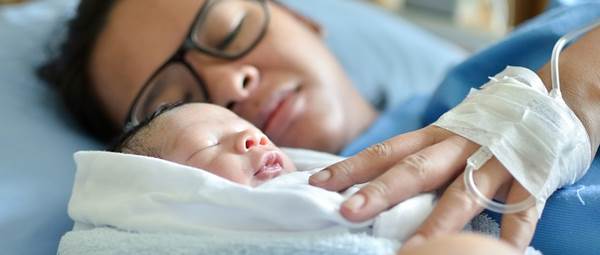About donation

Your donation is handled independently by our dedicated staff, leaving your midwife completely free to care for you and your baby. Donating your cord blood does not interfere with your chosen birth plan, the management of labour and delivery, or with the aftercare of you or your baby.
Please be aware that if you have chosen delayed clamping as part of your birth plan, this may impact on the chances of us being able to make a successful collection, however, in many cases we are still able to collect a viable amount of cord blood.
How will your cord blood be collected?
Once your baby has been born, your midwife will confirm that written or verbal consent has been given and will pass your placenta to our staff, along with your consent to collect form. Your placenta is then taken to a dedicated cord blood collection room within the delivery suite.
The placenta is placed in a sterile supporting structure and the cord is cleaned with an alcohol wipe. A needle is then inserted into the cord and the blood naturally flows into a collection bag. We need to collect at least 60ml of cord blood from one donation but we can collect up to 150ml.
Who can donate?
To donate your cord blood you must be aged 17 or over.
Most people are able to donate their cord blood. However, we must make sure that each donation is as safe as possible for the patient. We therefore ask our cord blood donors a series of lifestyle and medical questions to make sure that every donation is suitable for transplant.
Unfortunately, we cannot collect your cord blood if you are carrying twins or other multiples. This is because the placenta will be smaller than with single births, and we will not be able to collect enough cord blood from the placenta to achieve a donation volume sufficient for transplant.
You may donate if you have conceived using IVF, even if you have used a donor egg and/donor sperm, as long as the donor’s medical history can be provided at the time of collection or soon after. As long as there is no medical reason that the midwife needs to retain your placenta, we can collect your cord blood if you are having an elective or emergency caesarean.
Registration and consent
Once you have registered your interest by completing our online form, we will confirm receipt of this with you. We will also send you further details about the donation process.
In April 2007, a new legislation came into effect. The EU Directive for Tissue and Cells states that consent for the use and testing of your cord blood must be obtained prior to the birth of your baby (which includes active labour).
This ensures that you have had plenty of time to ask us any questions you have relating to the collection, testing and storage of your cord blood. We call this 'informed' consent, as we encourage you to make an informed decision about donating your cord blood.
Confidentiality
If you donate your cord blood, your name and the name, address and date of birth of your baby will be put onto our secure database along with test results relating to your donation.
At this point your donation is given a unique identification number so that all the information provided to the worldwide stem cell registries and transplant centres uses this number only, ensuring that your personal details remain confidential.
Research and development
Unfortunately, not every cord blood collection is successful. This may be due to a low volume of cord blood or if the cord blood clots during the collection procedure. This in no way indicates that there are any problems with you or your baby.
If your cord blood is not suitable for transplantation, it may be used for research and development (R&D), but only if you have given consent for us to do this. If consent for R&D has not been given and we are unable to use your cord blood then it will be thrown away using standard hospital practices.



